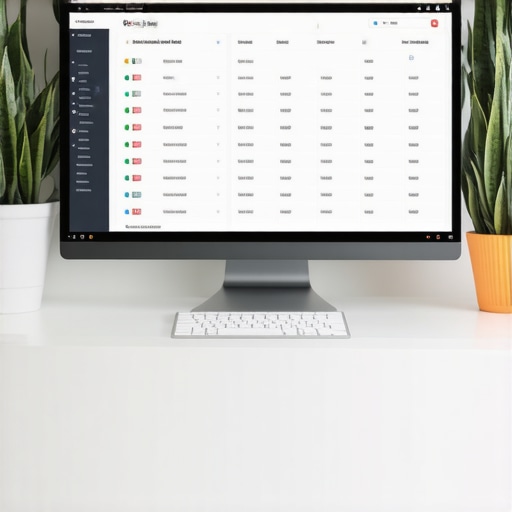My Personal Journey into Payroll Management: From Chaos to Clarity
When I first started my small business, managing payroll felt like navigating a maze blindfolded. The stress of keeping up with tax regulations, ensuring timely payments, and handling employee queries was overwhelming. I remember staying up late, trying to decipher complex payroll laws, often feeling unsure if I was doing everything right. That experience taught me the importance of effective payroll management, especially in today’s fast-evolving financial landscape.
Why Payroll Management Is the Heartbeat of Small Business Success
Over time, I realized that payroll isn’t just about paying employees; it’s about building trust and ensuring compliance. In 2024, with the rise of digital tools and compliance regulations, having a reliable payroll system is more crucial than ever. According to the Small Business Administration, proper payroll management can improve employee satisfaction and reduce legal risks. This insight motivated me to adopt smarter strategies that save time and prevent costly errors.
Practical Tips I Swear By for Better Payroll Handling
1. Embrace Automation to Save Time and Minimize Errors
Switching to payroll software transformed my business. Tools like Gusto or QuickBooks Payroll automate calculations, tax deductions, and filings. They also generate detailed reports, making audits less stressful. Automation not only reduces human error but also frees up my time for strategic growth activities.
2. Keep Up with Changing Regulations
Tax laws and employment regulations keep evolving. I subscribe to updates from authoritative sources like the IRS to stay informed. Regularly reviewing these updates helps me avoid penalties and ensures my payroll practices are compliant.
3. Regularly Review and Reconcile Payroll Data
I set aside time monthly to audit my payroll records. This simple habit catches discrepancies early, preventing bigger issues down the line. Accurate records also streamline year-end reporting and tax filings.
What Do I Wish I Knew Before? The Deeper Questions
How can small businesses ensure payroll compliance without a dedicated HR team?
In my experience, leveraging comprehensive payroll platforms and consulting with financial advisors or CPA services can make a huge difference. For example, exploring top CPA services can provide tailored advice that keeps your payroll compliant and efficient.
If you’re like me, juggling multiple responsibilities, I encourage you to share your payroll management tips or challenges in the comments. Together, we can learn from each other’s experiences and make payroll a smooth part of our business journey.
How Can Small Businesses Stay Ahead of Payroll Compliance Challenges in 2024?
As the landscape of payroll regulations continues to evolve rapidly, staying compliant becomes more complex yet more critical. Small business owners often find themselves caught between the demands of daily operations and the intricacies of tax laws, employment standards, and reporting requirements. My experience has shown that proactive strategies and leveraging expert resources are essential in navigating this terrain effectively.
One practical approach involves integrating comprehensive payroll software that updates automatically with new regulations, such as Gusto or QuickBooks Payroll. These tools not only automate calculations but also ensure timely tax filings and compliance alerts, significantly reducing the risk of penalties. Additionally, subscribing to updates from authoritative sources like the IRS or the Department of Labor keeps you informed about legislative changes that could impact payroll practices.
Another key element involves consulting with CPA services that specialize in payroll and tax compliance. These experts can offer tailored advice, audit your existing processes, and recommend adjustments to align with current laws. For example, exploring top CPA services can provide invaluable support, especially when preparing for audits or managing complex employee classifications.
Moreover, fostering a culture of continuous education within your team ensures everyone understands compliance requirements. Regular training sessions, updates on new policies, and clear communication channels can prevent costly errors and promote a compliant payroll environment.
What Are the Practical Implications of Non-Compliance in Payroll?
Failing to adhere to payroll laws can result in severe consequences, including hefty fines, back taxes, or even legal action. For small businesses, such setbacks can threaten financial stability and reputation. An example is misclassification of employees as independent contractors, which can trigger audits and penalties. Ensuring proper classification, accurate record-keeping, and timely filings are fundamental practices that mitigate these risks.
In addition, understanding the nuances of local, state, and federal regulations is crucial. While federal laws set the baseline, local ordinances may impose additional requirements, such as mandated paid leave or specific reporting standards. Staying compliant demands vigilance across all jurisdictions where your business operates.
Could Technology and Expert Advice Be the Twin Pillars of Seamless Payroll Compliance?
Absolutely. Combining advanced payroll software with expert CPA guidance creates a resilient framework that not only simplifies compliance but also enhances overall payroll accuracy. This synergy allows small businesses to focus on growth rather than legal anxieties, knowing their payroll operations are in expert hands.
If you’re seeking more insights on streamlining payroll processes, I recommend exploring resources like `https://financeauthoritys.com/top-cpa-services-for-seamless-tax-preparation-financial-solutions`. Sharing your experiences or questions in the comments can also spark valuable discussions—let’s learn from each other’s payroll journeys!
Reflecting on the Complexity of Payroll Compliance: A Personal Perspective
Over the years, my journey through payroll management has revealed that compliance isn’t just about ticking boxes; it’s about understanding the nuanced landscape of laws that vary by jurisdiction and evolve with time. I recall a period when I overlooked a minor state regulation, only to face a hefty penalty that nearly derailed my business. That lesson underscored the importance of continuous learning and proactive adaptation in payroll practices.
How Deep Does the Rabbit Hole Go? Unpacking the Intricacies of Payroll Regulations
One of the most challenging aspects I’ve encountered is employee classification. Distinguishing between an independent contractor and an employee can seem straightforward but becomes complex when factoring in gig economy roles or freelance work. Misclassification not only risks legal penalties but also affects tax obligations and benefits eligibility. Exploring resources like IRS guidelines has helped me navigate this labyrinth. The key is to stay informed about the latest court rulings and IRS interpretations, which often shift the boundaries of classification.
What Advanced Measures Can Small Businesses Take to Ensure Compliance Without Overextending Resources?
In my experience, leveraging advanced payroll software equipped with AI-driven compliance checks can be a game-changer. These systems automatically update with new laws, flag potential misclassifications, and generate audit-ready reports. Integrating such tools with expert CPA advice—like consulting through top CPA services—creates a robust shield against compliance pitfalls. It’s like having a legal and financial safety net tailored to your business’s unique needs.

The Personal Toll and the Rewards of Mastering Payroll Compliance
Getting payroll right isn’t just about avoiding fines; it’s about peace of mind. When I finally aligned my payroll systems with legal standards, I noticed a tangible shift in my business culture. Employees felt more secure and valued, knowing their compensation was handled correctly and transparently. This trust fosters loyalty, productivity, and a positive reputation—assets that money can’t buy.
However, the journey is ongoing. As regulations continue to evolve, so must our strategies. I’ve learned that staying engaged with industry updates, participating in webinars, and joining professional networks enriches my understanding and prepares me for emerging challenges.
Inviting Your Insights and Experiences
If you’ve faced similar hurdles or discovered effective solutions, I invite you to share your stories in the comments. Our collective experience can illuminate new pathways and reinforce best practices. Remember, mastering payroll compliance is less about perfection and more about continual improvement and vigilance. Let’s support each other in making payroll not just a task but a strategic advantage for our businesses.
Harnessing Technology to Navigate Complex Payroll Regulations
In my ongoing quest to stay ahead in payroll management, integrating cutting-edge AI-driven compliance tools has proven transformative. These sophisticated systems not only keep pace with rapid legislative changes but also proactively flag potential misclassifications or discrepancies before they escalate into costly penalties. For instance, platforms like Gusto now incorporate real-time updates aligned with federal and state laws, alleviating the burden of manual monitoring. Such technological advancements are indispensable for small business owners aiming to maintain compliance without expanding their administrative overhead.
Collaborating with Expert CPA Services: A Strategic Necessity
While automation streamlines many processes, the nuanced understanding of local regulations and employee classifications often requires expert counsel. Engaging with specialized CPA services, like those highlighted at top CPA services, offers tailored insights that safeguard against compliance pitfalls. These professionals conduct periodic audits, review classification statuses, and provide strategic advice to adapt payroll practices in response to evolving legal landscapes. Such partnerships transform compliance from a reactive chore to a proactive strategic advantage, empowering small businesses to focus on growth.
Why Continuous Education Is the Hidden Key to Compliance Resilience
As regulations become more intricate, the importance of ongoing education cannot be overstated. Participating in industry webinars, subscribing to authoritative updates, and engaging with professional networks foster a culture of vigilance and adaptability. I recall a pivotal moment when a webinar on gig economy worker classifications clarified ambiguities I faced, enabling me to implement more accurate payroll structures. This commitment to learning not only reduces legal risks but also instills confidence that payroll operations are resilient against unforeseen regulatory shifts.
How Can Small Businesses Develop a Robust, Scalable Payroll Compliance Framework?
Building such a framework involves a multi-layered approach: leveraging advanced payroll software with compliance analytics, maintaining close partnerships with knowledgeable CPA services, and cultivating a team culture of continuous learning. This triad ensures your payroll system remains dynamic and responsive to legislative changes, even as your business scales. For example, integrating AI-enabled tools that automatically update with new laws and flag potential issues—paired with expert audits—creates an almost fail-safe environment. It’s akin to constructing a financial fortress that adapts seamlessly to the legal landscape.

Fostering a Culture of Compliance: Beyond Tools and Tax Codes
Embedding compliance into your organizational DNA requires more than just software and advice; it demands a mindset shift. Regular training sessions, clear communication channels, and accountability metrics ensure that every team member understands their role in maintaining payroll integrity. When compliance becomes part of your business ethos, errors diminish, and the risk of penalties drops dramatically. This cultural integration is critical for long-term sustainability, especially as regulations continue to evolve unpredictably.
Encouraging Dialogue: Share Your Advanced Payroll Strategies
If you’ve experimented with innovative compliance tools, forged strategic CPA partnerships, or cultivated a compliance-first mindset, I invite you to share your experiences. Your insights could illuminate new pathways for fellow small business owners navigating the complex payroll terrain. Remember, mastery in payroll compliance isn’t a destination but a continuous journey—one that flourishes through shared knowledge and collective vigilance.
Things I Wish I Knew Earlier (or You Might Find Surprising)
1. The Devil Is in the Details
Early on, I underestimated how small overlooked compliance issues could snowball into costly penalties. A simple misclassification of an employee taught me to pay close attention to every detail in payroll processing.
2. Automation Is a Game Changer
Implementing payroll software like Gusto or QuickBooks Payroll not only saves time but drastically reduces errors. This shift allowed me to focus more on strategic growth rather than manual calculations.
3. Continuous Learning Is Essential
Regulations are ever-changing. Staying updated through IRS and Department of Labor resources helped me stay compliant without last-minute scrambles or penalties.
4. Expert Advice Is Worth Investing In
Partnering with a knowledgeable CPA or payroll consultant provided insights I couldn’t get from software alone. They helped tailor my payroll to fit evolving legal requirements, saving me money and stress.
5. Employee Classification Matters More Than You Think
Misclassifying workers can lead to audits and fines. I learned to clarify roles and consult IRS guidelines regularly, which kept my business safe and compliant.
Resources I’ve Come to Trust Over Time
- IRS Website: An authoritative source that offers comprehensive guidelines on payroll and employee classification. It’s where I go to verify laws and updates.
- Department of Labor: Essential for understanding employment standards and compliance requirements across states.
- Gusto: A payroll platform I recommend for its automatic updates and compliance features, making life much easier.
- Finance Authority’s CPA Services: Their tailored advice and audits have been invaluable in ensuring my payroll remains compliant and efficient. Check them out at here.
Parting Thoughts from My Perspective
Mastering payroll compliance in 2024 isn’t just about avoiding fines; it’s about building trust with your team and ensuring your business runs smoothly. Embracing automation, continuous learning, and expert partnerships has transformed how I manage payroll—making it less of a chore and more of a strategic advantage. If this resonated with you, I’d love to hear your thoughts or experiences. Feel free to share in the comments or pass this along to someone who might benefit. Remember, the journey toward compliance is ongoing, but with the right tools and mindset, it can be manageable and even empowering.






Reading about the journey from payroll chaos to clarity really hit home for me. When I first started my small catering business, managing payroll was overwhelming, especially with fluctuating regulations and multiple employees. I found that automating payroll with platforms like Gusto significantly reduced errors and freed up my time for strategic planning. One thing that helped me was setting up a monthly review process to reconcile all payroll data, which caught discrepancies early before they turned into costly mistakes. I wonder, how do others keep their payroll systems adaptable to local and federal regulation changes without overhauling their entire process each time? Do you think investing in premium compliance software is worth it, or are there other effective strategies? Insights from fellow small business owners would be great to hear.
This post really resonates with me because I’ve faced the same challenges early in my entrepreneurial journey. Managing payroll anytime regulations shift feels like trying to hit a moving target. I’ve found that investing in a comprehensive payroll software that offers automatic updates is crucial, not just for accuracy but also for peace of mind. However, I also believe that forming a strong relationship with a knowledgeable CPA is equally important. Combining tech tools with expert advice really seems to be the winning formula to stay compliant without constant upheaval. Regarding Emma’s question on adapting to changing regulations, I’ve learned that software solutions like Gusto or QuickBooks, paired with proactive consultations with a CPA, make it manageable. Have others found that periodic audits with professionals have caught issues that automated systems might miss? Would love to hear more strategies folks have used to keep everything running smoothly amidst regulatory flux.
Your post truly resonates with me, especially the emphasis on automation and continuous learning. When I first started managing payroll for my boutique consultancy, I also felt overwhelmed by the intricate regulations and the constant updates needed to stay compliant. Investing in a platform like Gusto allowed me to automate most calculations and filings, which drastically reduced errors. However, I’ve also found that periodic audits with a trusted CPA not only catch overlooked discrepancies but also provide peace of mind during tax season. The challenge I faced was balancing the costs of premium payroll software with the limited budget of a small business. For those in similar situations, I believe a layered approach—using reliable automation tools complemented by regular professional reviews—works well. How have others managed to keep their payroll systems adaptable without breaking the bank? Would love to hear any tips or resources that have worked in your experience.
Reading through the post really brought back memories of my early days managing payroll manually—what a nightmare that was! Switching to automation tools like Gusto made a huge difference, especially when it came to keeping up with ever-changing regulations. One thing I’ve found helpful is setting up a dedicated monthly review of all payroll entries to catch discrepancies early. It’s reassuring to see more small businesses embracing technology and professional advice together, as that seems to be the most effective way to stay compliant. Regarding employee classification, I recently read a deep dive on IRS guidelines, and I think regular training for staff and managers is essential to prevent misclassification. Do others here do anything special to educate their team about payroll compliance? I’d love to hear any tips or tools that have worked well for others in maintaining accuracy and peace of mind.
Reflecting on this post really highlights how crucial automation has become in payroll management. When I first started my small retail store, I also found myself overwhelmed by changing tax laws and payroll regulations. Switching to an automated platform like Gusto significantly simplified the process, but I also realized the importance of periodic audits. In my experience, combining reliable software with ongoing professional advice—like quarterly check-ins with a CPA—has been effective in catching discrepancies early. I’m curious, how do others balance investing in premium compliance software with budget constraints, especially for small startups? Do you think a tailored approach with layered reviews is enough to stay compliant without breaking the bank? Sharing strategies could really help fellow entrepreneurs navigate these complexities more confidently.